
A comic strip is a sequence of cartoons, arranged in interrelated panels to display brief humor or form a narrative, often serialized, with text in balloons and captions. Traditionally, throughout the 20th and into the 21st century, these have been published in newspapers and magazines, with daily horizontal strips printed in black-and-white in newspapers, while Sunday papers offered longer sequences in special color comics sections. With the advent of the internet, online comic strips began to appear as webcomics.
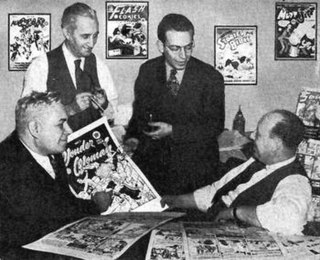
Maxwell Charles Gaines was a pioneering figure in the creation of the modern comic book.
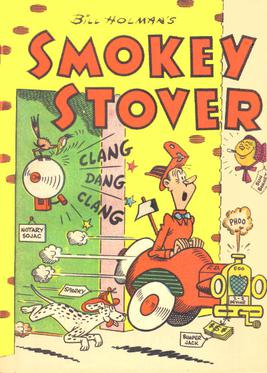
Smokey Stover is an American comic strip written and drawn by cartoonist Bill Holman from March 10, 1935, until he retired in 1972 and distributed through the Chicago Tribune. It features the misadventures of the titular fireman.

Toonerville Folks was a popular newspaper cartoon feature by Fontaine Fox, which ran from 1908 to 1955. It began in 1908 in the Chicago Post, and by 1913, it was syndicated nationally by the Wheeler Syndicate. From the 1930s on, it was distributed by the McNaught Syndicate.
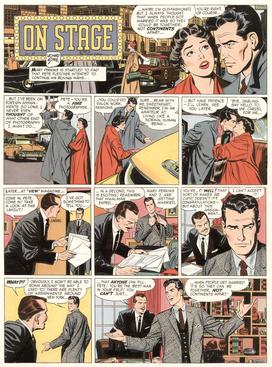
Mary Perkins, On Stage is an American newspaper comic strip by Leonard Starr for the Chicago Tribune-New York News Syndicate. It ran from February 10, 1957, to September 9, 1979, with the switch to the longer title in 1961. Some papers carried the strip under the shortened title Mary Perkins.
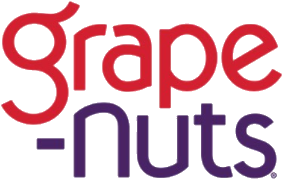
Grape-Nuts is a brand of breakfast cereal made from flour, salt and dried yeast, developed in 1897 by C. W. Post, a former patient and later competitor of the 19th-century breakfast food innovator Dr. John Harvey Kellogg. Post's original product was baked as a rigid sheet, then broken into pieces and run through a coffee grinder.

Chex is an American brand of breakfast cereal currently manufactured by General Mills. It was originally produced and owned by Ralston Purina of St. Louis, Missouri, using the name Chex starting in 1950. The Chex brand went with corporate spinoff Ralcorp in 1994. and was then sold to General Mills in 1997. Rival cereal company Kellogg's has the rights to the Chex brand in South Korea and Singapore.

Captain Easy, Soldier of Fortune is an American action/adventure comic strip created by Roy Crane that was syndicated by Newspaper Enterprise Association beginning on Sunday, July 30, 1933. The strip ran for more than five decades until it was discontinued on October 1, 1988.

The Funnies was the name of two American publications from Dell Publishing, the first of these a seminal 1920s precursor of comic books, and the second a standard 1930s comic book.

The Sunday comics or Sunday strip is the comic strip section carried in most western newspapers. Compared to weekday comics, Sunday comics tend to be full pages and are in color. Many newspaper readers called this section the Sunday funnies, the funny papers or simply the funnies.
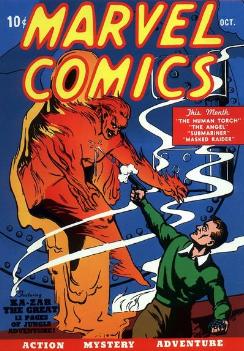
Funnies, Inc. was an American comic book packager of the late 1930s to 1940s period collectors and historians call the Golden Age of Comic Books. Founded by Lloyd Jacquet, it supplied the contents of early comics, including that of Marvel Comics #1, the first publication of what would become the multimedia corporation Marvel Comics.
Broom-Hilda is an American newspaper comic strip created by cartoonist Russell Myers. Distributed by Tribune Content Agency, it depicts the misadventures of a man-crazy, cigar-smoking, beer-guzzling, 1,500-year-old witch and her motley crew of friends.
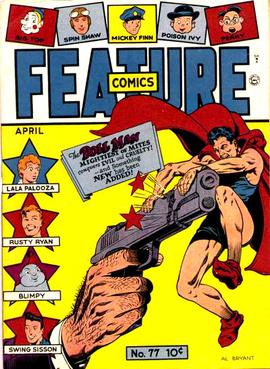
Feature Comics, originally Feature Funnies, was an American comic book anthology series published by Quality Comics from 1939 until 1950, that featured short stories in the humor genre and later the superhero genre.

Motion Picture Funnies Weekly is a 36-page American comic book created in 1939, and designed to be a promotional giveaway in movie theaters. While the idea proved unsuccessful, and only a handful of sample copies of issue #1 were printed, the periodical is historically important for introducing the enduring Marvel Comics character Namor the Sub-Mariner, created by writer-artist Bill Everett.
The Eastern Color Printing Company was a company that published comic books, beginning in 1933. At first, it was only newspaper comic strip reprints, but later on, original material was published. Eastern Color Printing was incorporated in 1928, and soon became successful by printing color newspaper sections for several New England and New York papers. Eastern is most notable for its production of Funnies on Parade and Famous Funnies, two publications that gave birth to the American comic book industry.

Saturday Morning Breakfast Cereal (SMBC) is a webcomic by Zach Weinersmith. The gag-a-day comic features few recurring characters or storylines, and has no set format; some strips may be a single panel, while others may go on for ten panels or more. Recurring themes in SMBC include science, research, superheroes, religion, romance, dating, parenting and the meaning of life. SMBC has run since 2002 and is published daily.
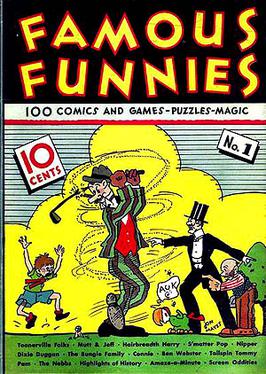
Famous Funnies is an American comic strip anthology series published from 1934 to 1955. Published by Eastern Color Printing, Famous Funnies is considered by popular culture historians as the first true American comic book, following seminal precursors.

Zachary Alexander Weinersmith is an American cartoonist and writer, best known for his webcomic Saturday Morning Breakfast Cereal (SMBC). Outside of SMBC, he is the co-creator of four books, a sketch comedy series, a podcast, and multiple other webcomics.
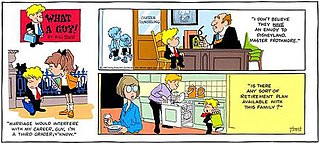
What a Guy! is an American comic strip created by Bill Hoest and Bunny Hoest, the team responsible for The Lockhorns and Agatha Crumm. It began in March 1987, just over a year before Hoest's death in 1988.
The Sunday Funnies is a publication reprinting vintage Sunday comic strips at a large size (16"x22") in color. The format is similar to that traditionally used by newspapers to publish color comics, yet instead of newsprint, it is printed on a quality, non-glossy, 60-pound offset stock for clarity and longevity. Featured are classic American comic strips from the late 19th century to the 1930s. The publication's title is taken from the generic label often used for the color comics sections of Sunday newspapers.
















